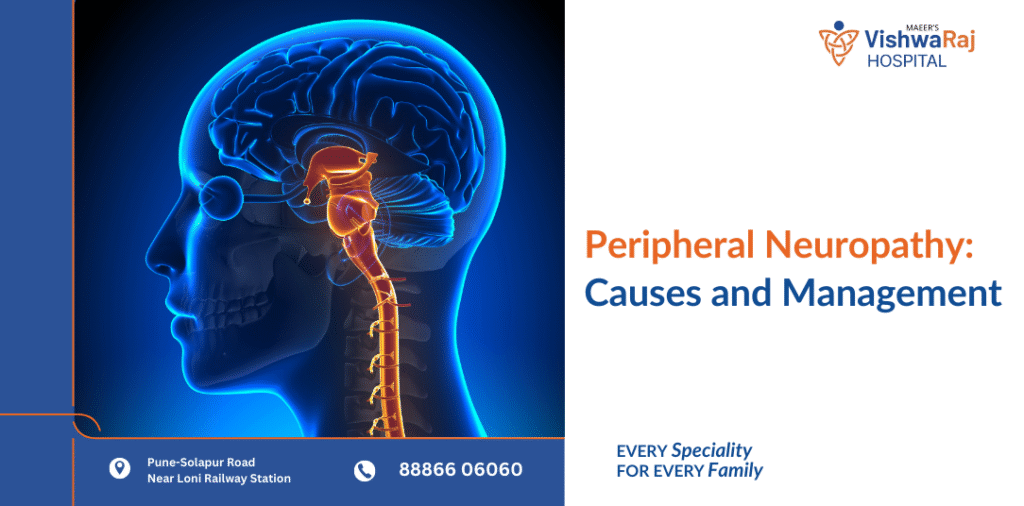Peripheral Neuropathy: Causes and Management
Peripheral neuropathy is a condition that disrupts the functioning of your peripheral nerves, which connect your brain and spinal cord to the rest of your body. This nerve damage can cause tingling, numbness, sharp pain, muscle weakness, also mobility issues. If untreated, it can impact your quality of life.
For control of peripheral neuropathy and also prevention of complications, a personalized management plan with early diagnosis are necessary. The Neurosciences Department VishwaRaj Hospital in Pune is trusted for its advanced diagnostic tools and compassionate care. For mobility and comfort, experts identify underlying causes and provide tailored treatments.

Let’s explore the peripheral neuropathy causes and associated signs.
Common Symptoms and Causes of Peripheral Neuropathy
Peripheral neuropathy will usually develop in a more gradual manner, and it starts within either the feet or hands. Spotting symptoms early can aid in improvement.
Common Symptoms
- “Pins and needles” or tingling sensations may occur within the hands or feet. Sensations often spread upward from that location.
- Numbness or reduced ability to feel pain or temperature changes.
- Pain may be sharp like stabbing or burning and sometimes gets worse at night.
- Muscle weakness or cramping or loss of coordination and balance.
- Someone can be extremely sensitive for touch so they may feel pain even from simple pressure.
- Skin may become thin or ulcers might heal slowly.
- Severe cases also show sweating changes or digestive and bladder problems.
Major Causes
- Diabetes: The leading cause of Peripheral Neuropathy in Pune and globally; high blood sugar damages nerve fibers.
- Infections: Such as shingles, hepatitis C, HIV/AIDS, and Lyme disease.
- Autoimmune disorders: Like rheumatoid arthritis, lupus, or Guillain-Barré syndrome.
- Vitamin deficiencies: Especially B vitamins and vitamin E.
- Alcohol abuse: Chronic alcoholism leads to nutritional deficiencies and direct nerve damage.
- Medications: Certain chemotherapy drugs, anti-seizure meds, and antibiotics.
- Trauma or nerve injury: Repetitive stress, accidents, or surgery.
- Hereditary disorders: Such as Charcot-Marie-Tooth disease.
- Kidney, liver, or thyroid disorders: Toxins accumulate and impact nerve health.
- Exposure to toxins: Industrial chemicals or heavy metals.
Addressing the root cause is the first step to effective peripheral neuropathy treatment. At VishwaRaj, Multispeciality Hospital in Pune, a team utilizes advanced testing to identify the precise cause of each patient’s condition.
Types of Peripheral Neuropathy
Peripheral neuropathy isn’t a single disease, but a broad category of disorders affecting different types of nerves. Understanding the type is crucial for tailored treatment.
- Mononeuropathy:
Often this type affects one nerve because of injury, localized pressure, or repetitive motion like in carpal tunnel syndrome.
- Polyneuropathy:
Multiple nerves suffer damage simultaneously, starting typically from the feet and hands and is most often linked to toxins or diabetes.

- Autonomic Neuropathy:
This type disrupts the nerves controlling automatic body functions such as blood pressure, heart rate, digestion, and bladder function.
- Sensory Neuropathy:
Sensory nerves are primarily impacted, causing symptoms like numbness, tingling, or pain, usually in the extremities.
- Motor Neuropathy:
Motor nerves are damaged, leading to muscle weakness, cramps, twitching, or difficulty moving.
At the Neurosciences Department VishwaRaj Hospital in Pune, specialists employ clinical assessments and nerve conduction studies to identify neuropathy types, ensuring the accuracy of targeted treatment.
Wondering how experts find out what’s causing your symptoms? Let’s explore the peripheral neuropathy tests involved.
How Peripheral Neuropathy is Diagnosed
Peripheral neuropathy isn’t a single disease, but a broad category of disorders affecting different types of nerves. Understanding the type is crucial for tailored treatment.
- Medical History Review:
For identification of potential causes, a specialist asks about all of your symptoms, health conditions like diabetes, a family history, medications that you use, and some lifestyle factors.
- Physical and Neurological Exam:
In order to assess nerve function, muscle strength is carefully checked along with reflexes and also with balance. The ability of one to feel sensations like touch, vibration, and temperature is also very carefully checked.

- Blood Tests:
These tests help detect infections, thyroid disorders, vitamin deficiencies, diabetes, and autoimmune markers that could cause neuropathy.
● Nerve Conduction Studies & Electromyography (EMG):
Electrical tests measure how well nerves and muscles are working, pinpointing the type and location of nerve damage.

● Imaging Tests (MRI or CT scans):
Imaging may be used to rule out structural issues—like herniated discs or tumors—that could compress nerves.
● Nerve Biopsy (Rare):
Sometimes, a small nerve tissue sample is taken for microscopic examination if the cause is still unclear after other tests.
Seeking relief from nerve pain and a means to get your mobility back? Let’s explore treatment options that can help you reclaim your life.
Treatment Options for Peripheral Neuropathy
While not all neuropathies can be completely cured, many symptoms can be managed, and further nerve damage can often be prevented.
- Addressing the Underlying Cause:
Treating conditions such as diabetes, infections, or vitamin deficiencies can help prevent further nerve damage and improve symptoms.
- Medications:
Pain relievers, certain antidepressants, and anti-seizure drugs (like gabapentin or pregabalin) help control nerve pain and discomfort.
- Physical Therapy:
Exercises within physiotherapy strengthen muscles improve balance and reduce fall risk.

- Lifestyle Modifications:
For the overall nerve health with the symptom control, support comes from a healthy diet with some regular exercise. Quitting smoking and limiting alcohol will also help.
- Topical Therapy:
Capsaicin creams and lidocaine patches provide relief from pain at specific sites when applied topically to the affected areas.
- Interventional Therapy:
In advanced situations, nerve blocks or TENS (transcutaneous electrical nerve stimulation) are employed to address ongoing pain.
- Multidisciplinary Care:
VishwaRaj Hospital’s Neurosciences Department offers personalized, holistic care, led by a team of specialists—including neurologists, pain management experts, and physiotherapists—to maximize recovery and comfort.
What happens if neuropathy goes untreated? Let’s look at the potential complications and the importance of prompt action.
Potential Complications of Peripheral Neuropathy
While not all neuropathies can be completely cured, many symptoms can be managed, and further nerve damage can often be prevented.
Untreated peripheral neuropathy can result in serious and at times permanent complications:
- Chronic Pain: Severe and also persistent nerve pain that may affect both sleep and mood.
- Loss of Balance and Falls: Weakness and numbness increase the risk of injuries.
- Foot Ulcers and Infections: Loss of sensation may allow wounds to go unnoticed, leading to serious infections or even amputations (especially in diabetics).
- Muscle Atrophy: Long-term nerve damage can cause muscles to waste away, limiting mobility.
- Autonomic Dysfunction: Blood pressure instability, digestive issues, heart rhythm disturbances.

- Disability: In severe cases, patients may lose independence, requiring assistance with daily tasks.
- Emotional and Mental Health Impact: Anxiety, depression, and reduced quality of life.
Conclusion
Managing peripheral neuropathy begins with understanding your symptoms, obtaining an accurate diagnosis, and following an individualized care plan. With advanced diagnostics, a multidisciplinary team, and patient-centered care, VishwaRaj Hospital is a leader in peripheral neuropathy treatment in Pune. From expert neurologists to cutting-edge technology, comprehensive solutions are available to help you live a healthier, more active life.
If you’re searching for experienced peripheral neuropathy doctors in Pune or want a precise diagnosis and actionable treatment plan, VishwaRaj Hospital is here to help every step of the way.
Frequently Asked Questions
Reference links:
https://my.clevelandclinic.org/health/diseases/14737-peripheral-neuropathy
https://www.cancer.org/cancer/managing-cancer/side-effects/pain/peripheral-neuropathy.html
Disclaimer: The information shared in this content is for educational purposes and not for promotional use.




